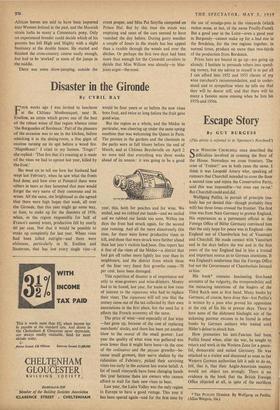Disaster in the Gironde
By CYRIL RAY rOUR weeks ago I was invited to luncheon at the Château Monbousquet, near St. Emilion, an estate which grows one of the best of the robust wines of that region whence come 'the Burgundies of Bordeaux.' Part of the pleasure 'of the occasion was to see in the kitchen, before attacking it in the dining-room, a fine gigot of 'mutton turning on its spit before a wood fire. 'Magnificent !' I cried to my hostess. 'Tragic!' she replied : 'That fire that it's roasting at is made of the vines we had to uproot last year, killed by the frost.'
She went on to tell me how her husband had wept last February, when he saw what the frosts had done, and how over at Pomerol there were .others in tears as they lamented that men would forget the very name of their commune and its wines. All the same, she brightened as she agreed that there were high hopes that week, all over the Gironde, that this year might go some way, at least, to make up for the disasters of 1956, when, in the region responsible for half of France's named wines, production fell by nearly d60 per cent. Not that it would be possible to make up completely for last year. Where vines had been killed outright—and there were châteaux, particularly in St. Emilion and Sauternes, that has lost every single vine—it would be four years or so before the new vines bore fruit, and twice as long before the fruit gave good wine.
But the region as a whole, and the Mddoc in particular, was cheering up under the same spring sunshine that was welcoming the Queen in Paris. The peonies in the gardens and the chestnuts in the parks were in full bloom before the end of March, and at Château Beychevelle on April 2 we were told that everything was three weeks ahead of its season : it was going to be a good year, this, both for peaches and for wine. We smiled, and we rubbed our hands—and we smiled and we rubbed our hands too soon. Within ten days the frost had struck again, for the second year running. And all the more disastrously this time, for there were fewer productive vines to kill, and those that were struck were farther ahead than last year's victims had\been. One report has it that of the vines of the Medoc—a district that had got off rather more lightly last year than its neighbours, and the district from which three of the four very finest first growths come-70 per cent. have been damaged.
This repetition of disaster is of importance not only to wine-growers and wine-drinkers. Money had to be found, last year, for loans at low rates of interest to the vignerons who had to replace their vines. The vignerons will tell you that the money came out of the tax collected by their own associations in the first place, but the need for it affects the French economy all the same.
The price of wine—and especially of fine wine —has gone up, because of the cost of replacing merchants' stocks, and there has been yet another blow to the moral of the small grower. Last year the quality of what wine was gathered was even lower than it might have been—in the case of the ordinaires and the paysan growths—be- cause small growers, their nerve shaken by the calamities of February, picked their surviving vines too early in the autumn lest worse befall. A lot of small vineyards have been changing hands this year because there are owners who cannot afford to wait for their new vines to bear.
Last year, the Loire Valley was the only region in Europe to have a good vintage. This year it has been spared again—and for the first time by the use of smudge-pots in the vineyards (which makes sense, at last, of the name Pouilly-Fume). But a good year in the Loire—even a good year in Burgundy—cannot make up for a bad one in the Bordelais, for the two regions together, in normal times, produce no more than two-thirds of the production from Bordeaux.
Prices here are bound to go up—are going up already. I hesitate to persuade others into spend- ing money, but my advice to myself is to put all I can afford into 1952 and 1953 clarets of my wine merchant's recommendation, and to under- stand and to sympathise when he tells me that they will be dearer still, and that there will be many a famous name missing when he lists his 1955s and 1956s.










































 Previous page
Previous page